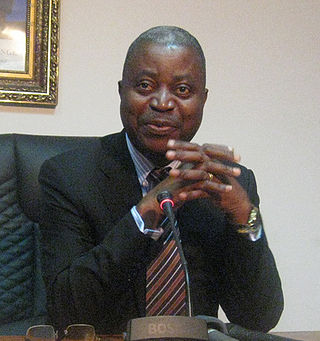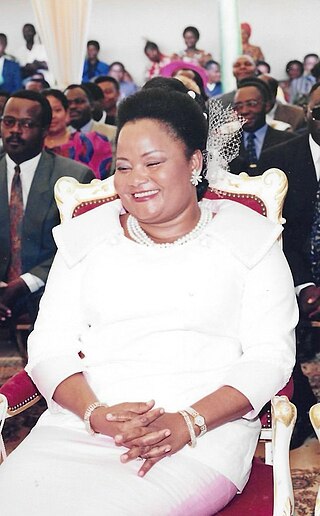Related Research Articles

Politics of the Democratic Republic of Congo take place in a framework of a republic in transition from a civil war to a semi-presidential republic.

Léon Kengo wa Dondo is a Congolese politician who served as the "first state commissioner" several times under Mobutu Sese Seko in Zaïre. He was one of the most powerful figures in the regime and was a strong advocate of economic globalization and free-market economics. He served as President of the Senate of the Democratic Republic of the Congo from 2007 to 2019.

Étienne Tshisekedi wa Mulumba was a Congolese politician and the leader of the Union for Democracy and Social Progress (UDPS), the main opposing political party in the Democratic Republic of the Congo (DRC). A long-time opposition leader, he served as Prime Minister of the country on three brief occasions: in 1991, 1992–1993, and 1997. He was also the father of the current President, Felix Tshisekedi.
The Movement for the Liberation of the Congo is a political party in Democratic Republic of the Congo. Formerly a rebel group operating in the Democratic Republic of Congo that fought the government throughout the Second Congo War, it subsequently took part in the transitional government and is one of the main opposition parties.

Antoine Gizenga was a Congolese (DRC) politician who was the Prime Minister of the Democratic Republic of the Congo from 30 December 2006 to 10 October 2008. He was the Secretary-General of the Unified Lumumbist Party.

Nzanga Mobutu is a Congolese politician. A son of the long-time President Mobutu Sese Seko, he served in the government of the Democratic Republic of the Congo from 2007 to 2011, initially as Minister of State for Agriculture and subsequently as Deputy Prime Minister for Basic Social Needs and Deputy Prime Minister for Labor, Employment and Social Security. He received the fourth-highest number of votes in the 2006 presidential election. In 2007, Nzanga founded the Union of Mobutuist Democrats as the successor to his father's Popular Movement of the Revolution and has led the party since.

The Government of the Democratic Republic of the Congo is the second institution in the central executive branch of the Democratic Republic of the Congo, the first institution being the President, who has the title of head of state.

Antipas Mbusa Nyamwisi is a politician and former rebel leader in the Democratic Republic of the Congo. He leads the Forces for Renewal political party and was Minister of Decentralization and Urban and Regional Planning until September 2011 when he resigned to run for president. He was previously the Minister of Foreign Affairs from 2007 to 2008.

Denis Kalume Numbi is a general and a politician in the Democratic Republic of the Congo (DRC). He was part of the Antoine Gizenga government as Minister of State for the Interior, Decentralization and Security. He was replaced in this position on 26 October 2008 by Celestin Mbuyu Kabango when the government headed by Adolphe Muzito was formed.

Adolphe Muzito is a Congolese politician who was Prime Minister of the Democratic Republic of the Congo from 2008 to 2012. Muzito, a member of the Unified Lumumbist Party (PALU), was Minister of the Budget under Prime Minister Antoine Gizenga from 2007 to 2008.

The Antoine Gizenga cabinet consisted of the Ministers of State, Ministers and Deputy Ministers appointed by Prime Minister Antoine Gizenga of the Democratic Republic of the Congo. Gizenga was Prime Minister from 30 December 2006 to 10 October 2008. His first cabinet was appointed on 5 February 2007, with 59 members. A new government was announced on 25 November 2007, with its size reduced to 44 ministers.
Symphorien Mutombo Bakafwa Nsenda is a politician in the Democratic Republic of the Congo. In October 2008 he was appointed Deputy Prime Minister for Security and Defense in the first Adolphe Muzito cabinet.
Louis Alphonse Daniel Koyagialo Ngbase te Gerengbo was a Congolese politician. He was appointed Deputy Prime Minister of the Democratic Republic of the Congo with responsibility for the Ministry of Postal Services, Telephones, and Telecommunications in the second cabinet of Prime Minister Adolphe Muzito. Following the resignation of Prime Minister Muzito, Koyagialo was Acting Prime Minister from 6 March to 18 April 2012, prior to the appointment of Augustin Matata Ponyo.

Pierre Lumbi Okongo was a politician in the Democratic Republic of the Congo.

Bobi Ladawa Mobutu also known as Mama Bobi Ladawa is the second wife and widow of Mobutu Sese Seko, who ruled Zaire as President between 1965 and 1997.

Colette Tshomba Ntundu is a politician from the Democratic Republic of Congo. She was elected national deputy for the constituency of Funa three times, in 2006, 2011 and 2018.

Félix Antoine Tshisekedi Tshilombo is a Congolese politician who has been the President of the Democratic Republic of the Congo since 24 January 2019. He is the leader of the Union for Democracy and Social Progress (UDPS), the DRC's oldest and largest party, succeeding his late father Étienne Tshisekedi in that role, a three-time Prime Minister of Zaire and opposition leader during the reign of Mobutu Sese Seko. Tshisekedi was the UDPS party's candidate for president in the December 2018 general election, which he was awarded, despite accusations of irregularities from several election monitoring organisations and other opposition parties. The Constitutional Court of the DRC upheld his victory after another opposition politician, Martin Fayulu, challenged the result, but Tshisekedi has been accused of making a deal with his predecessor, Joseph Kabila. The election marked the first peaceful transition of power since the state became independent from Belgium in 1960.

Martin Madidi Fayulu is a Congolese politician. He is the leader of the Engagement for Citizenship and Development party.

The Prime Minister of the Democratic Republic of the Congo Sama Lukonde assumed the office on 15 February 2021. He announced his first cabinet on 12 April 2021. On 24 March 2023, a second cabinet was announced.
Esdras Kambale Baekwa is a Congolese politician. On 25 November 2007, he was appointed as the Minister of Culture and Arts of the Democratic Republic of the Congo, under Antoine Gizenga's second cabinet that ran from 25 November 2007. He is the member of Unified Lumumbist Party (ULP).
References
- ↑ "Publication de la liste des membres du nouveau gouvernement congolais". African Manager. 2008-10-27. Archived from the original on 2011-07-25. Retrieved 2011-11-18.
- ↑ "Joseph Kabila Reshuffles Government". Congo News Agency. February 21, 2010. Retrieved 2011-11-18.
- ↑ Alex Engwete (September 12, 2011). "Limited cabinet reshuffle". Archived from the original on April 25, 2012. Retrieved 2011-11-21.
- ↑ "Joseph Kabila remanie le gouvernement". Le Potentiel. 20 February 2010. Retrieved 2011-11-22.
- ↑ "KINSHASA SEPTEMBER 11TH 2011". United Nations. Archived from the original on 2011-11-02. Retrieved 2011-11-18.